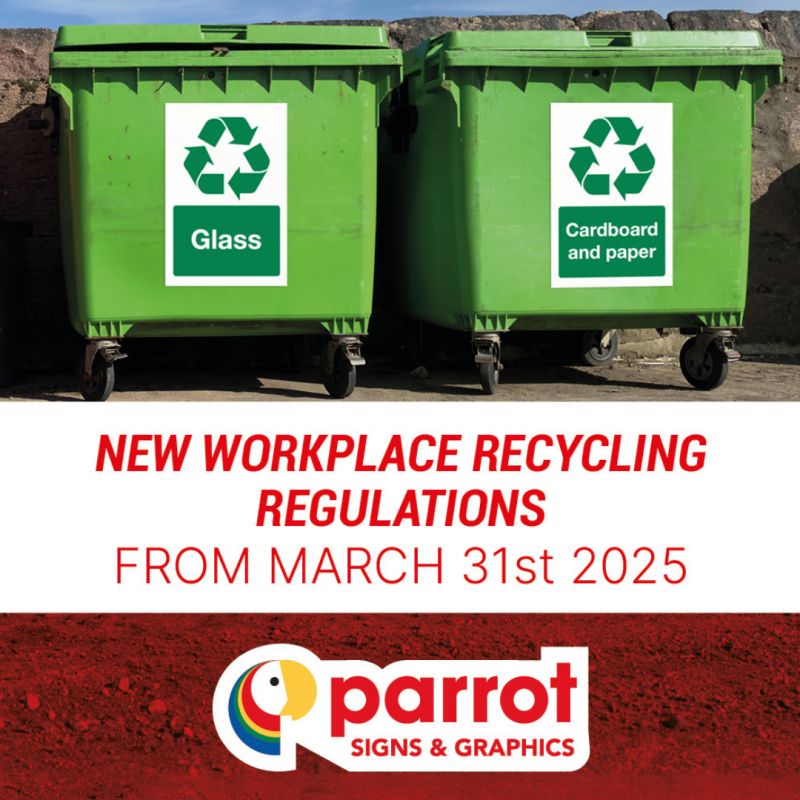Workplace Recycling Rules Changing in March 2025 What UK Businesses Need to Know
Mon 24th March 2025Starting from 31 March 2025, new regulations will come into effect in England, mandating that all workplaces, including businesses, public sector organisations, and charities with 10 or more full-time equivalent (FTE) employees, must separate recyclable waste into specific streams. This initiative, known as Simpler Recycling, aims to standardise waste management practices, enhance recycling rates, and promote environmental sustainability.
Key Requirements of the New Workplace Recycling Regulations
Under the new legislation, affected workplaces are required to segregate their waste into the following categories:
1 - Dry Recyclable Materials:
- Plastic: Items such as rinsed empty food containers and bottles.
- Metal: Includes drinks cans, rinsed empty food tins, empty aerosols, aluminium foil, and aluminium food trays.
- Glass: Such as drinks bottles and rinsed empty food jars.
- Paper and Cardboard: Items like old newspapers, envelopes, delivery boxes, and packaging
2 - Food Waste: All food leftovers and waste generated from food preparation, regardless of the volume or whether the workplace serves food or has a canteen.
3 - Black Bin (Residual) Waste: This includes absorbent hygiene products like nappies and highly contaminated materials such as food packaging that cannot be washed.
Workplaces generating garden waste are also legally obligated to manage it in accordance with the waste hierarchy, ensuring it is recycled or composted if this delivers the best environmental outcome.
Micro-Firm Exemption
Micro-firms, defined as businesses with fewer than 10 FTE employees, are granted an exemption until 31 March 2027. This provides smaller businesses additional time to adapt to the new requirements.
Steps to Ensure Compliance
To align with the upcoming regulations, business owners should consider the following actions:
1 - Assess Current Waste Management Practices: Conduct a thorough review of your existing waste disposal methods to identify areas that require modification to meet the new standards.
2 - Engage with Waste Collection Services: Discuss the new requirements with your current waste collector to arrange separate collections for dry recyclables, food waste, and residual waste. If your current provider does not offer the necessary services, you may need to contract additional providers. Ensure that any waste collection company you engage is registered on the Public Register of Waste Carriers, Brokers and Dealers.
3 - Implement Appropriate Waste Segregation Systems: Equip your workplace with clearly labelled bins to facilitate the correct separation of waste streams. This may involve providing separate containers for plastics, metals, glass, paper/cardboard, food waste, and residual waste. Using suitable recycling signs to indicate what goes where can also help employees and visitors sort their waste more effectively.
4 - Educate and Train Staff: Inform your employees about the new recycling protocols and provide training to ensure proper waste segregation. This will help prevent contamination of recyclable materials and promote a culture of sustainability within your organisation.
5 - Monitor and Review Compliance: Regularly evaluate your waste management processes to ensure ongoing adherence to the regulations. Address any issues promptly and consider periodic refresher training for staff.
Consequences of Non-Compliance
Failure to comply with these requirements by the stipulated deadlines (31 March 2025 for businesses with 10 or more FTE employees and 31 March 2027 for micro-firms) may result in receiving a compliance notice from the Environment Agency. This could lead to potential fines and damage to your organisation's reputation.
Benefits of Compliance
Adhering to the new recycling regulations not only ensures legal compliance but also offers several advantages:
- Environmental Impact: Proper waste segregation reduces the volume of waste sent to landfills, conserves natural resources, and minimises environmental pollution.
- Cost Savings: Efficient recycling practices can lead to reduced waste disposal costs and may provide opportunities for revenue through the sale of recyclable materials.
- Enhanced Corporate Image: Demonstrating a commitment to environmental responsibility can improve your organisation's reputation among customers, partners, and stakeholders.
The introduction of the Simpler Recycling regulations marks a significant step towards sustainable waste management in England. By proactively implementing the necessary changes, business owners can ensure compliance, contribute positively to the environment, and position their organisations as leaders in corporate social responsibility.
